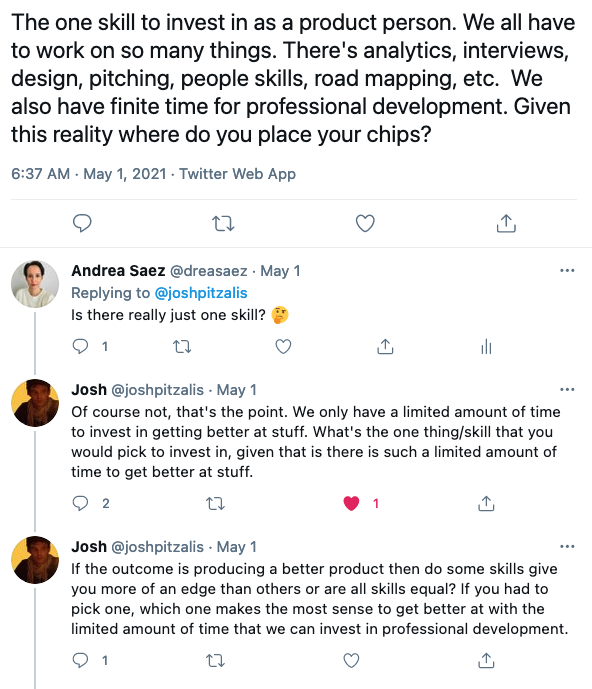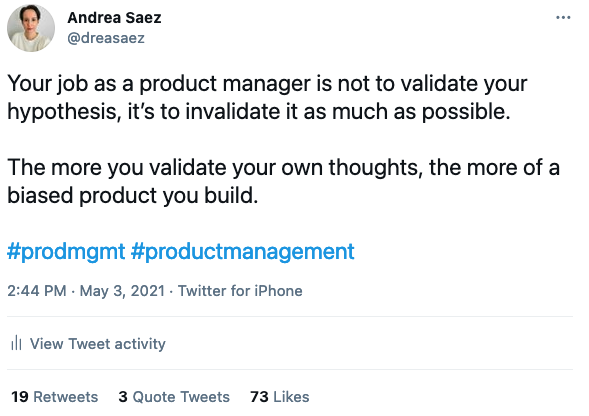
A few months ago I decided to tap into the Twitterverse and ask what my next topic to write about should be.
Lots of interesting thoughts came through, but the one that caught my attention was Josh Pitzalis’ answer:

Twitter Thread with Josh Pitzalis
This got me thinking — is there really a single most important product management skill above all others?
The short answer:
No.
The longer answer:
Yes.
If you’re looking to be a product manager, there are certainly a variety of things you could be focusing on.
Like Josh says, there’s analytics, roadmapping, prioritization…But the difference between good and great is defined by one product management skill that will truly set you apart from everyone else: empathy.
Empathy makes you a better problem solver
The product world talks a lot about outcomes over outputs and focusing on the problem space rather than the solution space.
This is all true.
But in order to really open yourself up to the discovery process, you need to have a level of empathy for your customers.
It’s very easy to get side-tracked by your own ‘gut feel’ and your own assumptions and try to lead a particular solution you feel might be better than others.
But in reality, product is about invalidating our own ideas, not trying to constantly validate them.
Otherwise, the result would be biased products that provide no actual solutions in the real world.

A good way of putting this in practice is by using Teresa Torres’ Opportunity Solution Tree.
You may have seen me write about this previously, and it’s because it’s really made my life infinitely better!
The OST helps you visualize your thinking and looks not at what the ‘best’ idea or solution might be, but what is the solution that gives you the greatest impact against your desired outcome.
When you add a product management skill like empathy to this framework, it helps you see what the best outcome is for the user, not for yourself.
Empathy helps you be a better product leader
A product manager leads through influence, not through authority. It took me a while to understand what that meant, but at the end of the day, it comes down to our keyword here: empathy.
A good way of influencing people is to be empathetic about their problems.
If someone comes to you with a problem and your answer is always ‘no’ (a term we seem to encourage product managers to use quite a bit,) you’ve now become a source of friction for them and the rest of your team.
Instead, change the conversation and focus on what problem they are having and why.
Where did this problem come from?
Who is it affecting?
Why is this happening?
Is there anything that can be done to temporarily alleviate the problem?
You’ve now gone from ‘no’ to opening up the conversation.
By being willing to understanding what the problem is, it is more likely the other person is then inclined to start negotiating and make certain trade-offs.
That is what product management is all about — listening, communicating, and problem-solving.
Empathy helps you be a better communicator
Part of developing your empathy skills means that your overall communication skills will be more inclusive. Instead of saying “I,” start using “we” — ie,
How does this affect us?
How can we solve this problem?
Who needs to be included?
A good product manager applies product thinking not just to their everyday work but encourages others to also do the same.
This means that when communicating with (and to) others, you’re not only using more inclusive words and terms, but you’re considering a wider audience.
For example, instead of thinking that your “sales team is the problem,” you know that there is a problem to solve, you help facilitate the conversation, and you communicate the problem internally without blaming anyone for it.
How to develop your empathy product management skill
I’ll be honest, I don’t know enough about this subject, but there is one thing I have learned over the last year:
Empathy starts with taking care of yourself.
You can’t expect to develop this product management skill for others if you haven’t done that for yourself.
Otherwise, you’ll burn out in no time.
A few things to practice on this front:
Take time off! (I still really struggle with this)
Shut down your phone and disconnect from work after a certain time.
Stay hydrated. (Thank you Fleur for always reminding me of this)
Stretch every 45 minutes, your body will thank you for it.
Meditate and practice mindfulness.
Breath. In for five, out for five.
Failure is a situation, not a person.
👉 If you’d like to learn more about empathy in product management, check out Kate Leto’s blog, and check out her webinar with The Product Dynamic below.

Andrea Saez

Read also

Experience the new way of doing product management

Experience the new way of doing product management






